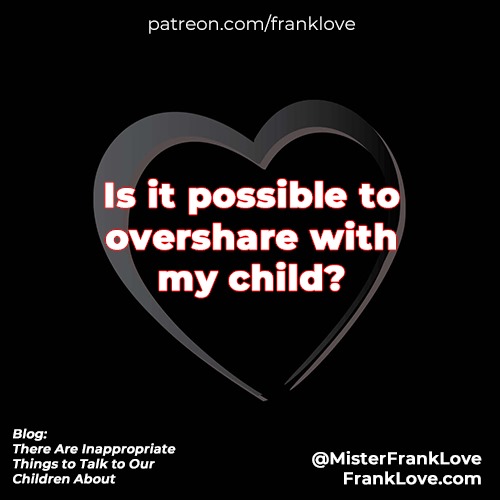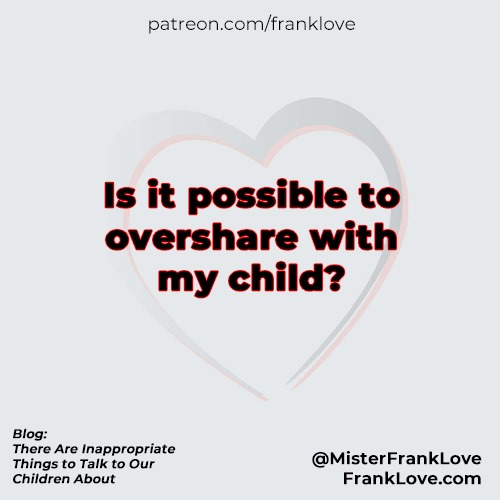
Parents mistakenly position kids in adult roles that they aren’t mature enough to play.
In my previous post, “Beyond Laziness: Teachers, Burdens, and the Practice of Curiosity,” we talked about how bringing curiosity and compassion to our interactions and relationships benefits both others and ourselves.
Over the years, I’ve witnessed countless parents who seem to believe that anything goes when talking to their children. They talk to their children about everything—personal opinions, heated disagreements, and even adult behaviors—as if children are miniature adults who can process it all. I vehemently disagree.
There are things I humbly believe are inappropriate to talk to our children about.
Why This Matters
If we already have children, chances are we’ve had moments where we overshared. Maybe we didn’t even realize it. Maybe we thought we were being honest or building trust or just being truthful. But too much honesty can be harmful when it’s the wrong kind, delivered at the wrong time, or to the wrong person. Examples of too much honesty can be:
- We’re not doing that because your father doesn’t have any money.
- We missed the application deadline because mommy didn’t do what she committed to.
- Your mother/ father doesn’t satisfy me sexually.
- If I could do it over, I would never marry your mother/ father.
- I want to do this but your mother/ father wants you to do something else instead.
Many children aren’t equipped to carry the emotional weight of their parents’ adult struggles. Even adult children. They don’t need to be dragged into our conflicts, used as sounding boards for our frustrations, or exposed to parts of the adult world they aren’t yet prepared to understand.
If you agree with me so far, then we’re probably on the same page. However, this blog is “particularly” for those that don’t understand the problem of exposing children to too much.
Breaking the Cycle
My goal is not to condemn parents or paint anyone as a “bad.” I hope to plant seeds of change, because our children will grow up and will hopefully have partners, marriages, and families. If no one intervenes, if no one helps them see what healthy and unhealthy conversation looks like, they’ll repeat what they experienced. They’ll perpetuate the same cycles of oversharing, confusion, and misplaced emotional responsibility that we might be unintentionally giving them.
That cycle can end.
When Children Have No Model
There are also young people who never had an example to work from. You’d be surprised how many teenagers have never seen their parents interact in a healthy, loving manner. They have no frame of reference for what’s appropriate or inappropriate because they’ve simply never seen it modeled.
That’s heartbreaking.
If we don’t give them guidance, they will stumble forward guessing. And when guessing about relationships and family, we often guess wrong.
A Direct Message to Our Children
The things that we, as parents, in my humble opinion, will not talk to our children about, include but are not be limited to:
- Our romantic drama
- Our intimate relationship details
- Our co-parent or co-parenting conflicts
- Certain adult financial struggles
- Certain personal issues or health challenges
- Their siblings’ struggles
Why? Because those conversations place our children in roles that are, in my humble opinion, not theirs. As young people, our children are not our therapists. They are not our teammates in conflict. They are usually not their caretaker, our adviser, or friend. They are our children. There is some nuance to this, particularly when we adults become elders/seniors. The roles can often reverse in part or completely.
Looking Ahead

Parents, let’s protect our children’s emotional well-being, so that they can become the kind of parents who protect their own children.
If they know better, they can do better.
And if we need support, advice, or comfort as we face adult challenges, let’s seek out other adults who are ready and equipped to offer the help we need instead of placing that burden on our children.
Join the Conversation
Parents, I look forward to your comments and feedback. Maybe this challenges you. Maybe it affirms what you’ve already been feeling. Either way, this is the start of an important conversation.
And to our children, you deserve to be protected from adult burdens. That is not weakness. It’s love.
In my next blog, “Teens—Your Parents May Be Oversharing,” I will talk about how misplaced emotional burdens can create unnecessary stress
Watch my video Oversharing with Our Children Related to this blog.
Support This Work
If you found this message valuable, share it. Like it. Subscribe. Comment.
And if you want to support this ongoing work, you can become a patron for as little as $2 a month at patreon.com/franklove.
Frank Love
Creating a Loving Culture in Our Relationships

